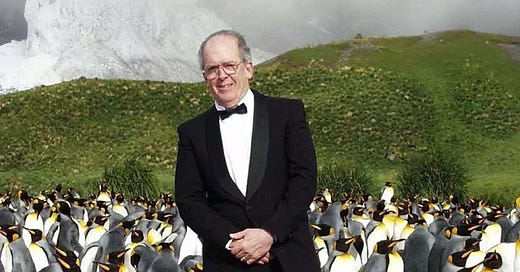En 1967 un ingeniero de la Marina de Estados Unidos le proporcionó al científico Robert Payne una curiosa grabación que habían tomado mientras escuchaban submarinos rusos.
Payne lo escuchó y estuvo seguro de que eran ballenas.
Listo como un conejo, Payne cogió esos cánticos y produjo el álbum “Songs of the Humpback Whale” en 1970.
Esto se convirtió en todo un símbolo para el movimiento Save the whales, una de las mayores iniciativas conservacionistas de la historia. Este movimiento se consiguió parar la caza de ballenas a gran escala y salvar a varias especies de la extinción.
Pero el avispado Payne no se quedó ahí. Pensó, si he liaó esta simplemente escuchando a las ballenas, imagínate si pudiéramos entenderlas.
Así que fundó una iniciativa que me ha cautivado: el proyecto CETI, un proyecto científico que intenta entender lo que dicen las ballenas. Claro, eso fácil no es, porque hablan debajo del agua, (muy debajo, de hecho) y encima hablan en balleno.
Pero ahí están intentando generar un diccionario balleno-humano.
De momento saben que tienen un lenguaje complejo, que varía entre grupos de individuos, lo que indica cultura, y un montón de cosas más que puedes ver en su web.
Mi sueño sería irme con esa peña en el barquito a estudiar a las ballenas. Ir así de reportera y luego contártelo en esta newsletter. Di que no mola. Pues lo intentaré, como me llamo María Jesús.
Pero de momento me encanta que presentarte a este señor maravilloso que falleció el año pasado. Mira que majete:
Su mujer decía de él que "La forma en que su mente trabajaba era una alegría constante. Constantemente buscaba respuestas, a preguntas también constantes."
Un verdadero científico, sí señor. Que se emociona con su trabajo y lo contagia a su alrededor.
No ves que cuanto más sabemos de los animales, nos damos cada vez más cuenta de que en realidad somos iguales. Cuantos más puntos de parecido encontremos, más empatía generaremos y mejor cuidaremos del planeta.
Estoy segura. Creo que es lo mismo que pensó Payne.
Si quieres transmitirle eso a tus hijos, tengo un cuento. Que habla sobre cormoranes que saben contar.
Las ballenas hablan, los cormoranes cuentan.
Qué cosas.
Lo puedes comprar aquí.
El cuento se compra aquí:
(Enlaces a amazon.es. Si estás fuera de España, abre “tu Amazon” y teclea Los cormoranes saben contar hasta siete. Está disponible en todo el mundo)
Un abrazo
Txus
Si te gusta esta newsletter, reenviala a un amig@ y que se suscriba aquí:
In 1967 a US Navy engineer provided scientist Robert Payne with a curious recording they had taken while listening to Russian submarines.
Payne listened to it and was sure they were whales.
Ready as a rabbit, Payne took those songs and produced the album "Songs of the Humpback Whale" in 1970. This became a symbol for the Save the Whales movement, one of the largest conservation initiatives in history. This movement succeeded in stopping large-scale whaling and saving several species from extinction.
But the astute Payne didn't stop there. He thought, if I've made a mess of this just by listening to the whales, imagine if we could understand them.
So he founded an initiative that has captivated me: the CETI project, a scientific project that tries to understand what the whales are saying. Of course, that's not easy, because they speak underwater, (very underwater, in fact) and on top of that they speak in whale language.
But there they are. At the moment they know that they have a complex language, which varies between groups of individuals, which indicates culture, and a lot of other things that you can see on their website.
My dream would be to go with these people in the little boat to study the whales. To go like that as a reporter and then tell you about it in this newsletter. Say it's not cool. Well, I'll try, as my name is María Jesús.
But for the moment I love to introduce you to this wonderful man who passed away last year. Look how nice he was:
His wife said of him that "The way his mind worked was a constant joy. He was constantly searching for answers, to constant questions".
A true scientist, yes sir. Who gets excited about his work and spreads it around him.
Don't you see that the more we know about animals, the more we realise that we are actually the same. The more similarities we find, the more empathy we will generate and the better we will take care of the planet.
I am sure of it. I think that's what Payne thought.
If you want to pass that on to your children, I have a story. It's about cormorants that can count.
Whales talk, cormorants count.
What a thing.
You can buy it here.
The story can be purchased here:
(Links to amazon.com. If you are outside US, open ‘your Amazon’ and type in Cormorants can count up to seven. It is available worldwide)
If you like Danio, forward it to a friend and have them subscribe here:




